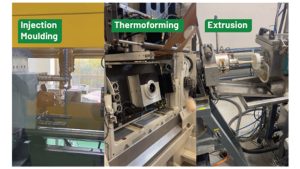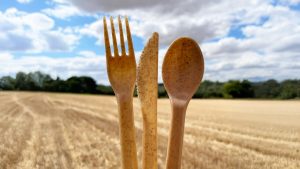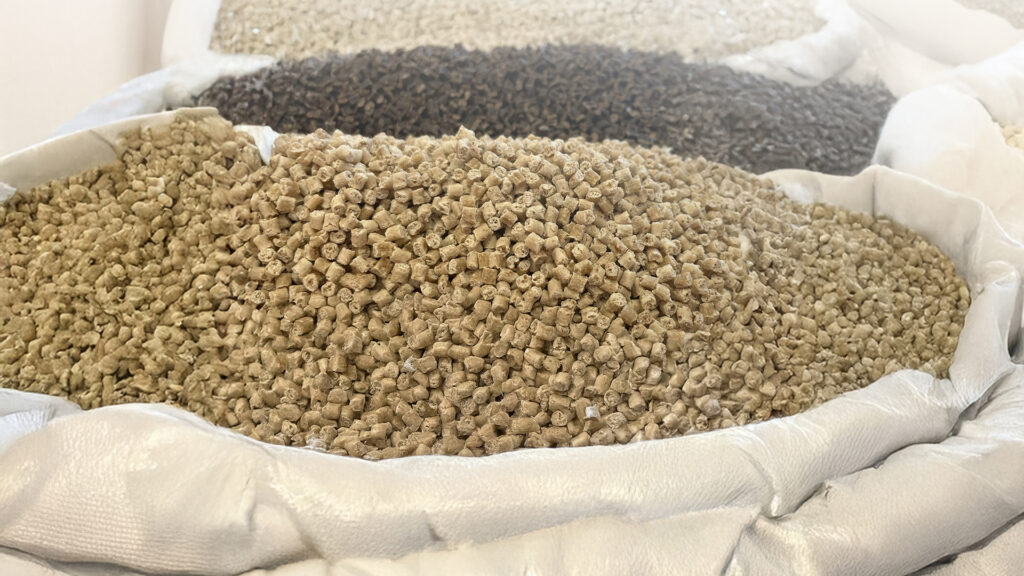Solinatra’s bio-based resins are compatible with standard production systems, yet offer a truly sustainable alternative to plastics from a variety of sectors.
Solinatra offers 100% natural, plastic-free, compostable biodegradable materials to facilitate the industry’s transition to sustainability without compromising performance, processes or planets.
Founded to address the urgent need for sustainability solutions, the company designs and produces fully compostable, biodegradable materials made from agricultural by-products. These materials provide the same consumer experience as traditional plastics and provide environmental benefits in line with global regulations and composability standards.
Focusing on compatibility, circularity and user experience, Solinatra materials provide a reliable and commercially viable pathway for industries that aim to reduce waste, meet regulatory goals and move away from fossil-based systems. Each resin is designed not only for environmental impact, but also for ease of adoption by manufacturers using existing infrastructure.
Solinatra’s bio-based and biodegradable materials are accredited to internationally recognized standards including EN 13432, ASTM D6866 and are regulated (EU) No. It complies with 2020/1245 (Amendment Regulation (EU) No. 10/2011). Food contact safety and composability claims are verified through third-party testing performed in accordance with EN 1186, giving brands and manufacturers trust in performance and compliance.

Solinatra Material
The core product range includes three major bioresing racks. Solinatra bioresin, such as a universal hood, designed for the first injection molding machine, has been developed for neutral colored food contact applications and is widely used in catering items such as compostable tools and trays. Universal Light and Universal Dark Resin offer alternative tones and aesthetic versatility, both supporting color adjustment using natural masterbatches. All grades meet strict composting and safety benchmarks.
For flexible product design, Solinatra offers variations such as Food Flex, Light Flex, and Dark Flex. They allow for medium bending and compression without exposure to cracking or stress white, making them ideal for dynamically used molded parts.
The extrusion compatibility range features Light X, Dark X and Straw Resin. They support flat or tubular profiles such as compostable straws and agricultural tubes, while ensuring structural performance during use and subsequent reliable disintegration.
Solinatra is home and industrial compostable certified by Tüv Industrial. It fails under both natural and controlled conditions without producing microplastics or leaving behind chemical residues. All properties are validated through internationally recognized testing protocols.
By offering this portfolio of bio-based resins, Solinatra supports manufacturers looking for sustainable plastic alternatives in a variety of production lines, providing the strength and quality needed in real industrial environments.
Integration
Materials made from renewable sources often fail under mechanical and thermal stresses during production. It can clog the injection mold, deteriorate with heat, and require expensive process adjustments. Solinatra resins are specially formulated to solve these problems.

Solinatra works directly with standard plastic processing equipment such as injection molding, extrusion and thermoforming machines. The resin follows a well-known thermal profile and does not require tool changes, die changes, or reconfiguration of the runner system. For manufacturers, this means avoiding capital expenditures on new infrastructure and preventing disruptions in existing line operations.
During production, Solinatra resin maintains consistent flow behavior and output quality. Even during repeated large amounts of cycles, the parts are formed neatly. Reports from commercial partners confirm that there is no reduction in yields or increased cycle times after switching from petroleum-based polymers.
For businesses using flex-grade resins, Solinatra supports product types that require slight flexibility and contact resilience. These are compatible with existing molds and automation sequences, even in sectors such as medical devices and foodservice packages.

The core principle is reliability. Solinatra resins are not designed for niche performance. It was developed for scalable production in actual factories. Switching to Solinatra doesn’t require any compromise, confusion, or retraining.
application
Solinatra’s bio-based plastic-free resins are already used in multiple industries. These are not pilot trials, but are proven applications in the supply chain that function.
The Food and Beverage sector uses Solinatra resin to produce biodegradable cutlery, compostable straws and sustainable coffee capsules. Everything is safe for food contact, heat resistant within operational ranges, and structurally stable under handling conditions. These products will deteriorate in a few weeks under a home or commercially available composting environment, leaving no microplastics or chemical residues.

In agriculture, solinatra resin is used in mangrove planting pots that support marine planting without polluting vulnerable marine ecosystems. On land, the same material forms a thermoformed nursery pot that will break safely in soil or compost after use. These solutions are designed for direct deployment on-site with minimal environmental impact.
In the tourism and hospitality industry, Solinatra is used to produce disposable hotel amenities such as toothbrushes, combs, shoe corners, and cotton bud sticks. These daily essentials offer the convenience and friendliness of traditional plastic, but are made from materials that break down cleanly and safely.
These examples illustrate simple but powerful truths. If the product can be made from plastic, it can also be made from Solinatra. This material is available in a variety of grades to suit your stiffness, flexibility and deliverable requirements. All formats are compatible with standard machines to ensure fast and cost-effective adoption.
For projects that require customized performance, Solinatra resin can be used for adjustment. The company works with converters and brands to fine-tune material properties such as heat resistance, tensile strength and composting speed to ensure that the material meets both the product and its sustainability goals.
Solinatra shows that sustainable bioclastic materials are not limited to packaging and low-load items. These resins are practical and scalable, and already support brands who replace traditional polymers without compromising customer experience or ease of manufacture.
For more information, visit www.solinatra.com or find out how Solinatra fits existing production lines at www.solinatra.com/seamlely-integrated.
This article will also be featured in the 23rd edition of Quarterly Publication.
Source link

